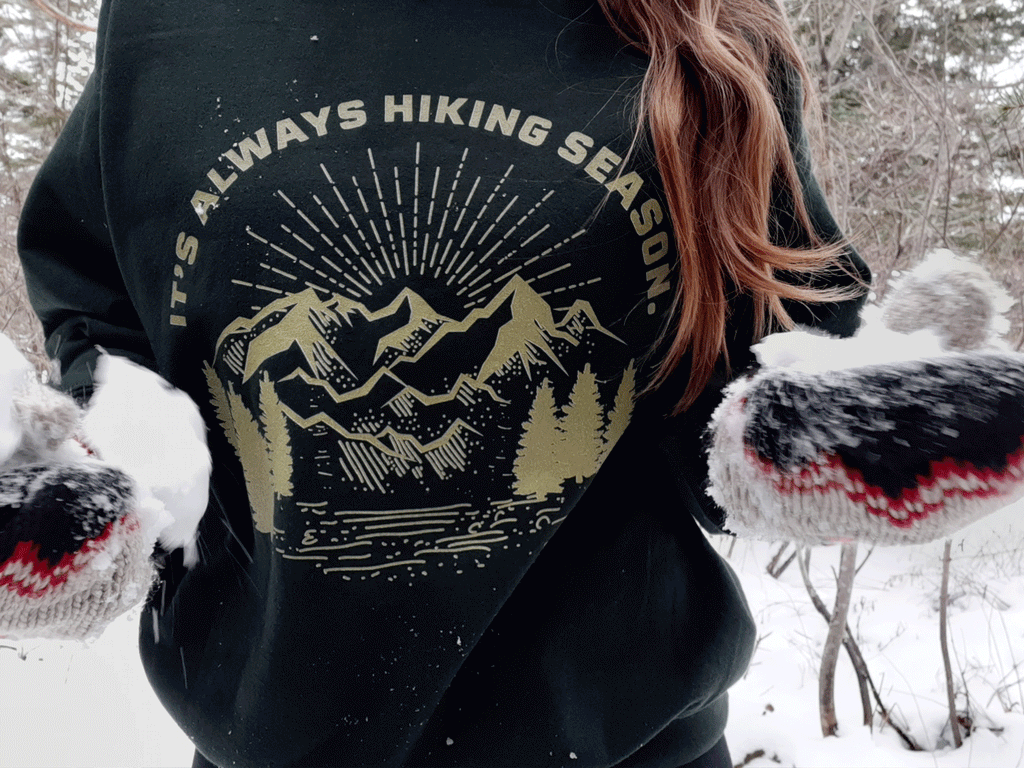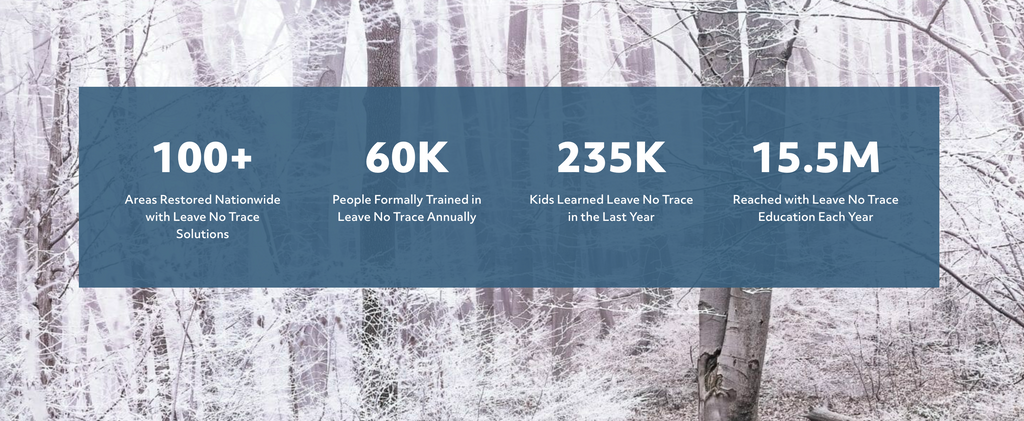
If you're a hiker, snowshoer, cross-country skiier or trail runner, it goes without saying that enjoying nature is a huge part of why you choose to hit the trails.
Acknowledging our presence, and our impact on the environments we enjoy is important. Keeping our wild spaces clean is something we can all contribute to, and in the spirit of that, here are a few things we like to keep in mind here at The All-Season Co.

Clean Up After Yourself... and Others
Littering while on a trail is a high up on the rules for trail etiquette. Littering anywhere is a no-no, but especially when you’re out in nature, on a trail that isn’t heavily trafficked, during a season that keeps other hikers and runners at home.
And how about setting an even better example, and pick up each other people's trash. We all know the cringe-y feeling that comes when happily progressing up or down a trail, and seeing a plastic water bottle or a can discarded along the side. Reaching down and picking it up may sound even more cringe-worthy, but it is a self-less thing to do (please keep yourself safe in the process - watch out for... needles! germs! Covid! etc!).
If it helps, remind yourself not to judge. Sure, that water bottle could have been thrown there by a person who doesn’t care about anything beyond themselves, doesn’t believe in climate change and isn't someone you'd want to get into a conversation about these things with. Or, it could have been accidentally dropped by a hiker who had forgotten their hydration system at home and had no choice but to buy a bottle of water to sustain the hike, attempted to keep the discarded bottle in their back pocket, and then didn’t realize they had dropped it until reaching their car. Reframing works, and nature can breathe a bit easier for your extra efforts.
Sign up for the All-Season Co newsletter for more content for runners who get outside, no matter the weather.

Research
Most trail hounds that we know would consider themselves environmentalists - at least to some level. Most recycle, some avoid air travel, and a few even offset our carbon. But if you start researching the true impact, we all have on our natural environment, it becomes very clear that there is always more for all of us to learn.
A great starting point is the Leave No Trace: Center for Outdoor Ethics website. They offer training that is based on the widely known and accepted Seven Principles of Leave No Trace that all outdoorspeople can keep in mind in order to limit their impact on the environment while they are out enjoying it:
- Plan Ahead & Prepare
- Travel & Camp on Durable Surfaces
- Dispose of Waste Properly
- Leave What You Find
- Minimize Campfire Impacts
- Respect Wildlife
- Be Considerate of Other Visitors
These principles may all seem straightforward, but when you explore each one more deeply, you can come across all kinds of ideas that groups like the Center for Outdoor Ethics have already extensively researched. They also regularly review and update the current theories and attitudes about each principle, so that they can be constantly adapted to the needs of today’s world.
A couple of examples of things that you may not have thought about just from reading the list of the Seven Principles:
- Dispose of Waste Properly: This may seem obvious (pick up that water bottle!), but did you realize that using soap to wash your hands in a river might be contaminating that river? Even if its biodegradable, there could be a risk that you’re adding something new to an ecosystem that was doing just fine before you got there.
- Leave What You Find: The immediate interpretation on this one is that we shouldn’t steal things from nature. Sure ,no problem! Who would do such a thing anyway! Plenty of people that’s who. That stick you picked up because it looked like a good hiking pole may have belonged to an animal. Or the pretty pine cone your child picked up and wants to bring home may be an important component somewhere on the food chain.
The Leave No Trace principles challenge us to think more deeply about topics like these, and many others.

Give Back
If you are lucky enough to live by a trail system that you regularly frequent, you can investigate whether there is a volunteer organization associated with the trail or park. These volunteer groups often gather for one day a month to help with trail maintenance. Sometimes that can be as easy as litter control, other times it can be assisting the paid staff of the park with light construction projects, blaze corrections, or other trail maintenance activities.
Activities like these are great for teens or school groups, because it allows them to learn the basics of volunteering with established organizations without the stress of people-facing volunteer activities at that age. The psychological benefits that come from giving back through your efforts, time, or money are huge, and this is a great way to get those paybacks started early.
You can even make a vacation out of it. There are many volunteer organizations that offer trips that include time spent volunteering on the trails you’ll be visiting as part of the experience.
How do you do your part to help keep the trails clean? Let us know in the comments below, or connect with us on Instagram.

